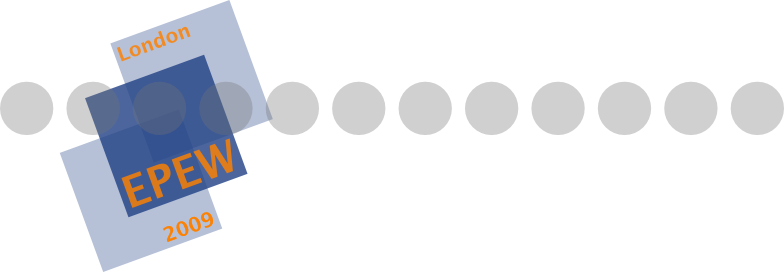EPEW Information
Scope
The European Performance Engineering Workshop is an annual event that aims to gather researchers working on all aspects of performance modelling and analysis.
We solicit original papers on performance evaluation techniques for computer and telecommunication systems analysis as well as for the analysis of manufacturing systems, real-time and embedded systems. Papers on or related to the following topics are particularly welcome.
- Performance-oriented design and analysis methods
- Formal modelling paradigms: stochastic process algebra, stochastic Petri nets, stochastic automata networks, Markov chains, queueing theory
- Solution and simplification techniques for Markov processes and non-Markovian stochastic processes
- Model checking and validation
- Approximate results for Markov and semi-Markov Processes
- Simulation techniques and experimental design
- Benchmarks and benchmark evaluation
- Performance tools
- Performance case studies
- Performability modelling
- Software performance engineering
- Performance and power consumption tradeoffs
- Performance overhead of secure systems
- New frontiers of performance evaluation/modelling
- Performance analysis of communication networks, mobile and wireless networks, software systems, distributed systems, system architectures, embedded systems, web-based systems, grid computing, peer-to-peer networks, publish-subsribe architectures
Programme Committee
- Jeremy Bradley, Imperial College London (UK)
- Mario Bravetti, Università di Bologna (Italy)
- Lucy Cherkasova, HP Labs (USA)
- Michel Cukier, University of Maryland (USA)
- Tadeusz Czachórski, Polish Academy of Sciences, Gliwice (Poland)
- Jean-Michel Fourneau, Université de Versailles (France)
- Stephen Gilmore, University of Edinburgh (UK)
- Marco Gribaudo, Università degli Studi di Torino (Italy)
- Uli Harder, Imperial College London (UK)
- Armin Heindl, Universität Erlangen-Nürnberg (Germany)
- Helmut Hlavacs, University of Vienna (Austria)
- András Horváth, Università di Torino (Italy)
- Carlos Juiz, Universitat de les Illes Balears (Spain)
- Tomáš Kalibera, Purdue University (USA)
- Helen Karatza, Aristotle University of Thessaloniki (Greece)
- Leïla Kloul, Université de Versailles (France)
- William Knottenbelt, Imperial College London (UK)
- Samuel Kounev, Technische Universität Darmstadt (Germany)
- Fernando L. Pelayo, University Castilla-La Mancha (Spain)
- Aad van Moorsel, Newcastle University (UK)
- Manuel Núñez, Universidad Complutense de Madrid (Spain)
- Catalina M. Lladó, Universitat de les Illes Balears (Spain)
- Marco Scarpa, Università di Messina (Italy)
- Markus Siegle, Universität der Bundeswehr München (Germany)
- Mark Squillante, IBM T.J. Watson Research Center, NY (USA)
- Miklós Telek, Budapest University of Technology and Economics (Hungary)
- Nigel Thomas, Newcastle University (UK)
- Sabine Wittevrongel, Universiteit Gent (Belgium)
- Katinka Wolter, Humboldt Universität zu Berlin (Germany)
- Maria G. Vigliotti, Imperial College London (UK)
- Soraya Zertal, Université de Versailles (France)
Local Organisers
- Jeremy Bradley, PC Chair
- Uli Harder, Publicity and Local Co-chair
- Maria G. Vigliotti, Publicity and Local Co-chair
Previous Workshops
- EPEW'08, Palma de Mallorca
- EPEW'07, Berlin
- EPEW'06, Budapest
- EPEW'05, Versailles
- EPEW'04, Toledo



